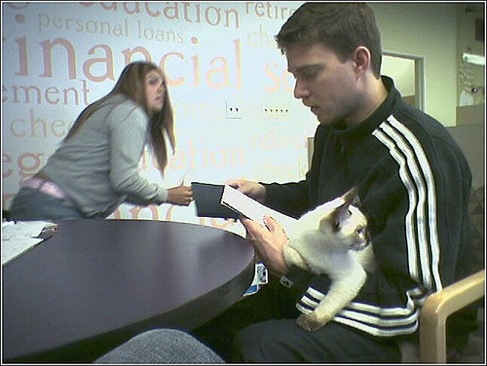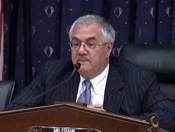Carey has a hot new Ted Stevens bon mot, gleaned from his liveblogging of the Senate Commerce Committee Hearing On Number Portability, coming from the same crazy-old-man-stratosphere as his infamous “series of tubes” remark.
news from the swamp

Liveblogging The Senate Commerce Committee Hearing On Number Portability
Join us today at 10 am Eastern as we liveblog the Senate Committee on Commerce, Science, and Transportation hearing on telephone number portability. These are the laws and procedures governing your ability to take a phone number started with one carrier to another. Historically, telephone companies have sought to limit customer’s portability rights.

../../../..//2007/07/11/house-votes-to-cut-student/
House votes to cut student loan interest rates by from 6.8 percent to 3.4 and increase grants for poor student by $890 by 2011 [AP]

../../../..//2007/07/11/surgeon-general-testifies-that-bush/
Surgeon General testifies that Bush administration applied pressure to supress key health reports to serve political purposes. [NYT]

House Subcommittee Taking A Look At Unfair Overdraft Fees
US PIRG blog tells us, “Chairwoman Carolyn Maloney (D-NY) of the House Subcommittee on Financial Institutions and Consumer Credit is holding a hearing today on unfair bank overdraft fees and their impact on consumers, especially in regard to debit card transactions.” Chairwoman Maloney has introduced a bill that addresses overly-punitive fees that are often assessed when a consumer buys a small amount on a debit card. As US PIRG points out, “It’s much easier to overdraw your (debit) account. A debit card gives you a latte if you have no money. A latte costs $5 but the bank gets a $30 overdraft.”

FCC Proposes New Rules To Further "Unlock" Cellphones
Sick of boring handsets with crippled features? So is FCC chairman Kevin Martin. He’s proposing “sweeping new rules” that would apply to the 700mhz spectrum that is soon to be vacated as television goes digital. What will the new rules be?
Under Martin’s proposal, to be circulated in the agency as early as Tuesday, mobile services in these airwaves would have to allow consumer choice.
Weak Passengers Bill Of Rights Moves Through Congress
The House and Senate are competing to see who can pass the weakest version of the Passengers Bill of Rights. The Senate Committee on Commerce, Science, and Transportation passed one version in May, allowing airlines to deny passengers the right to deplane by filing contingency plans with the government. The House Committee on Transportation and Infrastructure passed another version last week denying passengers any right to deplane. We compare the race to the bottom, after the jump.

Fed Issues Guidelines To Prevent Subprime Implosion Redux
•Refinance Opportunities: Prior to any rate increase, consumers will have 60 days to refinance the loan.
Trade groups find fault with the regulations because they will prevent risky borrows from receiving credit:

Supreme Court Allows Manufacturers To Dictate Minimum Prices, Screws Consumers
The Supreme Court ruled today in Leegin v. PSKS that manufacturers can collude with retailers to set the minimum prices of products, arguing that such a decision was good for competition. Succumbing to the court’s recent bender of conservatism is a 96 year-old precedent from Dr. Miles v Park that held minimum price accords as intrinsically – or in legalese, “per se” – illegal. Writing for the majority, swing-Justice Anthony Kennedy showed kiddies the dangers of taking crazy pills:
../../../..//2007/06/28/supreme-court-ends-96-year-ban/
Supreme Court ends 96-year ban on manufacturers conspiring to set minimum product prices.

Senate Committee Votes To Ban Caller ID Spoofing
The Senate Committee on Commerce, Science, and Technology has voted to outlaw caller ID spoofing. The measure, S. 704, would make it illegal to “to cause any caller identification service to transmit misleading or inaccurate caller identification information.” Companion legislation sailed through the House earlier this month, giving the measure an excellent chance of becoming law. Senator Ted Stevens (R-AK) said the legislation was necessary to prevent false information from clogging up the tubes:

Senate Proposal To Allow Generic Versions Of Biotech Drugs After 12 Years
A Senate proposal would strip biotech drugs of their patent-protected status after twelve years, opening the door to competition from generic drug makers. Patent protection determines how long obnoxious pharmaceutical CEOs can spend outside their competitor’s offices dancing with their drugs to MC Hammer’s 1990 hit, “U Can’t Touch This.” Unlike regular drugs made by chemical synthesis, biotech drugs are derived from human proteins.

FDA: New Dietary Supplement Safety Rules
The FDA has announced new manufacturing standards for vitamins, herbs and other dietary supplements in order to help ensure quality throughout the manufacturing, packaging, labeling and storing process.

Senate Passes Energy Bill With New Fuel Economy Standards
The Senate has passed an energy bill that establishes new fuel economy standards.
Key Parts Of 2003 Fair And Accurate Credit Transactions Act Still Unimplemented
Major parts of the 2003 Fair And Accurate Credit Transactions Act (FACTA) still haven’t been put into practice, says Chi Chi Wu, staff attorney at the National Consumer Law Center, in an LATimes article. Here’s some of the things that are missing:

Crappy Spyware Bill To Give More Power To Spyware Companies?
The EFF is encouraging consumers to write their Senators about a new “spyware” bill that has been, in their words, “massaged by by lobbyists for the software and adware industries.” Cory Doctorow of BoingBoing says the bill
“makes it impossible for consumer rights groups to sue DRM companies for putting spyware in their DRM (like Sony did last year, with its rootkit DRM). The irony is that spyware is already illegal, so all that this act does is immunize big media companies that sneak spyware onto your computer.”
Spyware is spyware, we think, even if it comes with a Sony/BMG logo.




